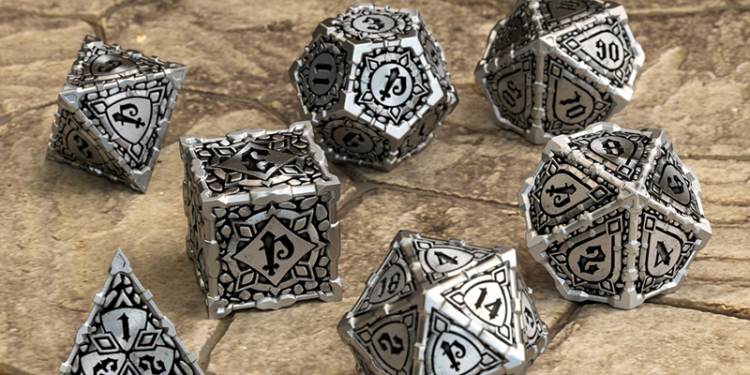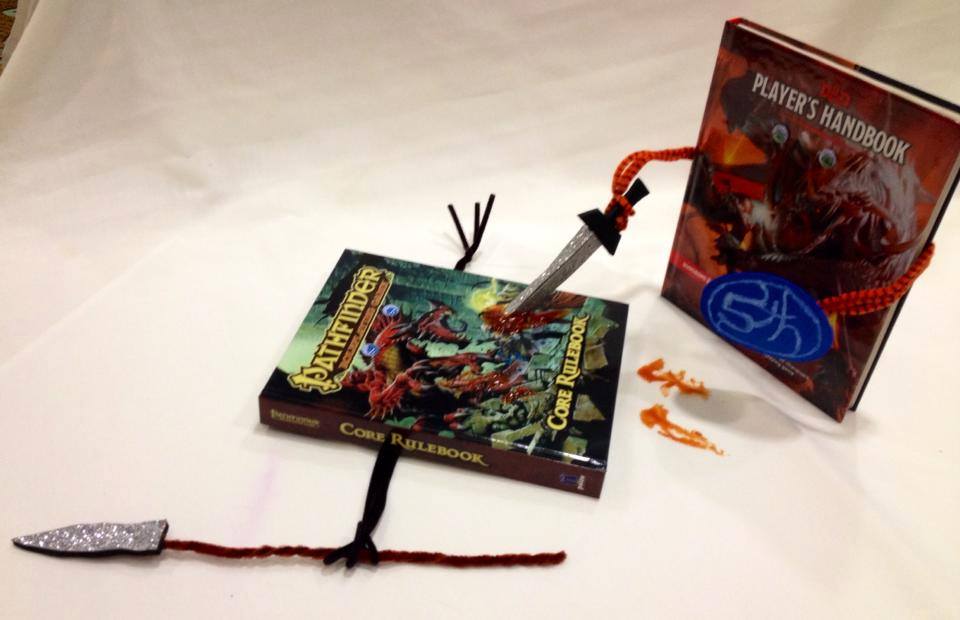Immersion, Kayfabe, and Tabletop Streaming

It’s been a minute since I’ve written about tabletop RPGs and professional wrestling. While I could write about it a lot more, I’m keeping it to around the four “WWE majors” for the year – Royal Rumble, Wrestlemania, Summerslam, and Survivor Series. I missed writing about the Royal Rumble this year, as painkillers and other medicine made it a blurry memory. Regardless, I’ve been thinking about something for a while now, and have been holding off writing about it because I didn’t think it had a lot to do with tabletop games – regardless of how interesting I think it is. This is silly thinking, of course. Thanks to the ever-growing number of podcasts and livestreams, we are reaching yet another shared space for storytelling. So, let’s discuss immersion, kayfabe, and tabletop streaming.
The O-Kayfabe Coral
Before we discuss anything else, we need to talk about kayfabe. In the simplest terms, it’s staying in character. In complex terms, it’s so much more. Kayfabe (kay faybe) has been around just about as long as there has been a professional wrestling industry. No one is quite sure how the term got started, but there are plenty of theories. One theory suggests the term dates to a “mute” wrestler named Kay Fabian. Another says it’s just pig latin for “be fake.” Yet another says it comes from the Eastern European wrestling promoters who dominated the scene between the first and second world wars. The heavy accent of the promoters turned “keep cavey” – a derivation of the latin “caveo” or “look out for” – into “kayfabe.” Personally, I believe the unclear origin is appropriate for a term about purposefully muddling the lines between fact and faction.
Kayfabe encompasses a lot within the wrestling industry. At a high level, it refers to the practice of treating the matches as non-scripted events. Funny enough, the history of wrestling tells us it’s an open secret from almost minute one that matches are scripted. There are plenty of backstage accounts describing witnessing practice, or knowing outcomes ahead of time. Of course, it’s not just about outcomes. It’s about the characters and stories, as well.
We’re talking about the Undertaker and Kane being supernatural, Irwin R. Shyster being a tax collector, or the Miz being an A-list movie star. We’re talking about Roman Reigns and Braun Strowman hating each other and needing to be kept apart by the entire locker room. It’s Shane McMahon firing Kevin Owens and Kevin Owens changing his Twitter handle to his old name on the independent wrestling circuit. Now, it’s really easy to say this is silly in this day and age; we know wrestling is all fake now, thanks to some court-related testimony from the late 80’s.
As with so many other things, this is ultimately the fault of New Jersey. Vince McMahon testified that the WWE (then WWF) was not a competitive sport. This was important for a couple of reasons. First, if you aren’t a sport, you don’t have to follow the safety regulations of a contact sport. Second, you also aren’t subject to mandatory drug policies or regulatory bodies of specific states – look at the history of the MMA in New York, for example. With this testimony, that should have been the end of it right? Well, not so fast.

Blurred Lines – Like the song, but less icky
Fast forward to now, and everyone knows the outcomes of the matches are scripted. Instead of the results of the matches being the focus, it’s the “lives of the wrestlers” that take center stage. Not only are there two reality shows featuring women wrestlers – Total Divas (a holdover from when the women’s division was the diva division) and Total Bellas (a spin-off featuring the Bella twins) – the storylines blur the lines between fantasy and reality as often as possible.
Agree with it or not, using relationships as a storyline is common in professional wrestling. In more than one instance, fake relationships have turned into real relationships, sometimes because of the very nature of attempting to keep kayfabe alive. For example, Lita was dating Matt Hardy, but began a relationship with Edge during a storyline where Lita left her “husband” Kane for the bad-boy Edge. Since it was sort of a well-publicized event, the WWE turned the tension between those three into a storyline. On the flip side, Stephanie McMahon had a kayfabe relationship with Triple H that has turned into a long-term relationship.
Behaving Badly
Behavior issues also tend to feature prominently in kayfabe storylines. Most recently, the WWE fired Enzo Amore as some pretty awful accusations swirled around him. Regardless of the validity of them, he put the WWE at risk by failing to notify them of a fairly long-term investigation ongoing into those events. If you look back a year before this, the WWE storylines are pretty interesting. In that year, Enzo broke up with his long term tag-team partner, Big Cass, and was rumored to have been kicked out of the locker room for his behavior, but also ended up as the champion of one of the divisions. Are these all related? Well, it’s hard to say for sure.
Enzo underwent a heel turn – becoming a bad guy after being a good guy – around the same time as the rumors of his behind-the-scenes behavior began to surface, and his tag-team partner was talking about his antics. It wasn’t long after this that Enzo was in a match against the cruiserweight champion and won as a result of a low-blow. Using these dirty tactics is typically a heel maneuver. He then had a lengthy – as far as these things go – reign as champion before the accusations hit and he was fired. WWE is a massive company who doesn’t like to expose themselves to risk. Is anyone so valuable they would put up with constant bad behavior from them? Was this a case of using the company rumors to their advantage, or was it a case of the company rumors being spread in order to sell an upcoming storyline? Good questions.
Kayfabe in the Information Age
As I am sure everyone is aware, the world has changed a lot thanks to the internet. Wrestling and tabletop roleplaying are no exception. Social media, blogging, vlogging, news magazines, and websites have all contributed to an overwhelming amount of information being available at everyone’s fingertips. Everyone knows when a real injury occurs and when someone is faking being injured for a storyline. Wrestlers are photographed at gyms and behind the scenes at venues, killing the element of surprise about a run-in or a match. Despite this, I’m here to tell you that kayfabe is actually more alive than ever.
Instead of fighting this, the WWE has leaned into it, hard. I’m not talking about just the obvious stuff like leaking rumors of conflict behind the scenes, having shows that break kayfabe, like Up, Up, Down, Down on Youtube, or letting wrestlers appear in other properties as different characters. I’m talking about how they have redefined the culture without seemingly anyone knowing about it. The core dynamic of “face vs. heel” has been evolving over the last few years to the point where the script has entirely flipped. To see this in full swing, let’s look at Roman Reigns. Yeah, I know we’ve done this before, but it matters here.

Keep Roman, Roman, Roman
Fans have long complained about the push Roman Reigns has received from the company. They feel he’s undeserving, doesn’t have a wide skill set, and they don’t like the character – a self-assured man who stands up to bullies. Fans have longed for him to “turn heel,” and become an out-and-out villain. After all, the fans are already booing him, so why not use those boos to your advantange? I even said as much in the comments of the article I linked above. Here’s the thing, he’s already a heel.
Thanks to the aforementioned sources of information, we get to hear the plans for Roman that the WWE has let slip, such as Roman vs. Brock for the Universal Title headlining this year’s Wrestlemania. We are treated to a storyline where Roman claims Brock is “Vince McMahon’s boy,” and that Brock receives preferential treatment above all of the other stars. The fans bristle at this. In their eyes, Roman is taking the accusations fans heap on him and is throwing them at Brock. To make matters worse, the story also features an injury to Roman’s ribs. Thus the narrative becomes, “Roman Reigns overcomes tremendous odds to defeat a foe few have ever defeated, while also deposing the top company man.” Needless to say, fans are all rolling eyes and bristling hides.
However, let’s look at the underlying facts of the situation. Fans think Roman is undeserving of being the Universal title. They believe he is taking away the opportunity from other wrestlers. Common belief is Vince McMahon has hand-selected Roman over all other competitors to be the face of the company. Somehow, an injured Roman is going to defeat an opponent that has defeated every other big name in the company – including wrestlers considered the best current working wrestlers. To add insult to these perceived injuries, Reigns ended the career of one of the most well-known, beloved wrestlers of all time during the main event of last year’s Wrestlemania – the Undertaker.
Take this together, and it’s pretty obvious he IS a heel. It’s just from a step removed from the expected level of heel. The character is a good guy. He’s supposed to be a workman that’s finally getting his due. However, everyone knows the behind the scenes and how the bookings supposedly work. Roman Reigns, as a character, doesn’t need to be a heel. Roman Reigns the wrestler is currently a heel. The amount of booing should tell you that much. People think this multi-million dollar company that reacts to actual fan outrage at near the speed of light somehow doesn’t hear all the booing going on and is turning a blind eye to “what fans really want.” I don’t understand that leap of logic. At all.
Immersion, Kayfabe, and Tabletop Streaming
Okay. You read through 1700 words of wrestling discussion and are probably thinking, “get to the fucking monkey.” I like to think the discussion was equivalent to a tasteful depiction of Naomi Watts’ form in silhouette, but whatever. Regardless, we’ve braved the dangers of Skull Island and here we are. Let’s talk about streaming tabletop games… again. While what I discussed two years ago hasn’t been perfectly borne out, it’s been pretty close to the rising success of so much streaming. The estimable Brandes Stoddard has also talked at length about the near-future of streaming, building in part from our discussions and his own experiences.
Right now, we are enjoying the boom of actual plays, podcasts, and high-production session shows. This is fantastic, as there is a show for just about everyone and the levels of inclusion have skyrocketed, drawing an audience that has no interest in actually playing, but wants to see the story and experience the roleplaying. Just as the WWE has made the audience into a living character through the WWE Universe stuff (the audience is a heel at the moment, but I expect a face turn for it soon thanks to Daniel Bryan), the tabletop audience is in the early stages of taking on a life of its own.
This is superb for a lot of reasons, but most of all due to the ways new people are welcomed in because they also share a love for this thing. This does eventually shift – look at the burgeoning nonsense between OSR-hardliners and new fans who don’t play – but we are in the honeymoon stage, and likely will be for another year or so at the least.
However, after this grace period, we are going to be in a position where there is a lot of content, and people are going to need to start making choices on what grabs their attention. I would love for everyone to not be dicks about what shows they watch and like, but uhhh… I’ve been on the internet. I have every expectation that we’ll start seeing rifts develop and brand loyalty deepen. On top of that, people who get a lot of love for appearing and performing on these shows will absolutely begin to build followings that identify with them. Once that happens, having these personalities on different shows – or retaining them on the same show – becomes more of a focus for shows trying to survive or make a splash. This is to say nothing of the stories being told.
Serial Killers
With any long-running TV show, novel series, or movie franchise, fatigue sets in. This isn’t a criticism. It’s difficult to continue telling stories about the same characters for a long period of time and have their growth and decisions be meaningful. Now, tabletop streams might or might not suffer the character stagnation due to each “season” having characters come and go, but as time goes on I expect that to change – think all-star seasons – and for the players to be consistently invited back. While some players will have myriad characters and portray them with great depth, that won’t be the case for everyone – even with the help of reality writers. I am not saying these shows use reality writers now, but it’s foolish to think this is outside the realm of possibilities.
The shows will also have to contend with the consistent storytelling of the DMs. While the quality right now is excellent, think of what this model looks like after five or ten years. This is to say nothing of twenty or forty years. DMs are going to tell similar stories and there are going to be comparisons. It’s inevitable. That doesn’t necessarily mean it’s bad – countless successful Shakespeare adaptations tell me the opposite – but it does mean that things can become stale and predictable. In general, the table interactions are going provide a lot of cover for this, but even that becomes hit or miss over the years. Cast issues aren’t a challenge at the moment, but if you look over the next few years, I would be shocked to see this remain the case.
Another critical issue that can’t be ignored is lore accuracy and consistency. While I certainly don’t care a flip if two games set in the same world are congruent or play well together, I am also not attempting to share and publish with the scale of audience that these streams possess. If you are looking to put out content from the streams – and make no mistake, that’s going to be an ultimate content goal – it’s more important that the stream highlight what you are selling. That doesn’t mean there isn’t going to be a load of creative license – there will be – but it does mean you will see restrictions in some areas.

The Future
This brings me back to what’s happening in the WWE right now. The way the WWE is using social media to drive the drama and to redefine their tried-and-true narratives is nothing short of inspired. Sure, it’s possible I have misconstrued all of this and they ARE the dunderheaded ignorati that some people assume them to be. I find this to be unlikely. The WWE is telling the same stories they always have, and are getting the same reactions they have in the past. It’s just the way they are telling those stories is totally different. People haven’t yet cottoned on to what they are doing, and are thus giving the product these huge, visceral reactions they haven’t had in a number of years. People are buying in at a whole new level. It’s kind of amazing, really.
Tabletop streams would be outright foolish NOT to adopt this level of meta-textual storytelling at time goes on. Even more so than a giant apparatus like the WWE, these streaming shows can be flexible and responsive in ways that are to be envied. We see this a number of times in scripted movies about the genre, but it’s not quite the same thing. Having a serial show where it’s ostensibly reality TV/Actual Plays but the drama and tension mimics the “real world” is something these platforms can take great advantage of.
Players can have their own channels where they perform “talking head confessionals” discussing the stories and their feelings on what is happening. Tension at the table results in table groups splitting up and recombining into “stables” or “factions.” Former players can become DMs of their own groups set in the same world, but telling a different story with the same characters, creating a different sort of drama and tension. The show can bring in third parties with seemingly neutral story settings to have the groups face off with each other – if not head to head in PvP then in forking stories to decide the outcomes of things. There are a lot of possibilities here to extend the same drama ascribed to characters to their players.
This might not be something we see in the short term, but we will see this in the long term. It just makes too much sense and continues to grow and carve out space for itself in the industry. I also don’t think this is a bad thing. This sort of drama attracts new fans, on top of the fans that are there for the content. Some of them might not even know why they are the fans of the thing, if they are honest with themselves. This is all to the good. Streaming and actual plays have to continue to grow and expand. Finding larger audiences and ways to continue to be relevant is a huge part of that.
Some Final Thoughts
Hopefully none of this seems pessimistic. I am extremely happy with the resurgence of roleplaying within popular culture and the burgeoning streaming/actual play/podcast products and community. These things benefit everyone who cares about the roleplaying game industry. Instead, this is only to shed some light on what I see as a potential future path for growth and sustainability.
As I have said before, nothing happens in a vacuum. While wrestling isn’t the same as tabletop games, it would be silly to ignore the fact that wrestling has been about people roleplaying for damn near a century. They just hit people in the face and supplex them through tables instead of rolling dice. Still, this is collaborative storytelling. The wrestlers often suggest outcomes, persona elements, and story choices. It just happens behind the scenes and isn’t in the moment the way a tabletop rpg is. As live streaming continues to gain momentum – and it will for the next few years without question (I’d say three is a safe bet) – it has to go through the growing pains of any other industry.
There are certainly worse models to follow than that of the WWE. It reinvents itself time and again to stay relevant, and so will live streaming games. It’s just the truth of the matter. I think it’s in a better place to do so than just about any other entertainment genre out there at the moment, too. As long as it can learn from watching others, we are going to see a truly special thing develop over the next decade.
I can’t wait.


